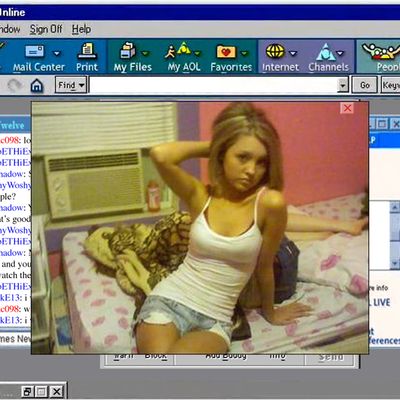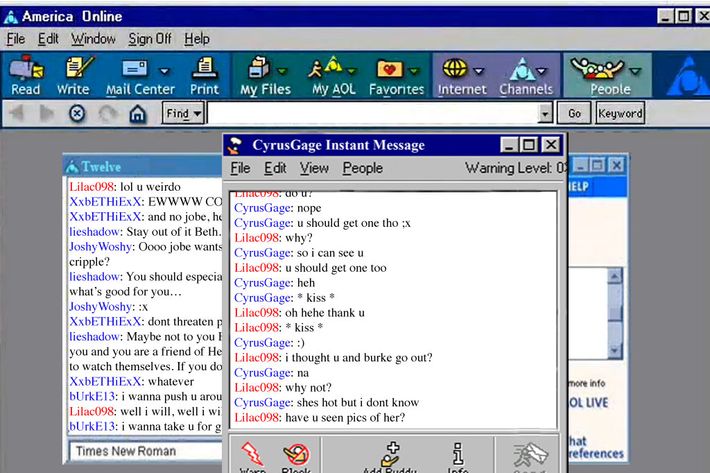
Internet nostaglia pop quiz: Do you remember what ToS means? It’s a verb, as in, “if u get ToSed that sux.” Ann Hirsch does — and she remembers BFFAEAE, n00b, Matchbox 20 lyrics, and a number of now-fuzzy emoticons. (“;x,” anyone?) The 28-year-old Brooklyn video and performance plumbed her personal online history for Twelve, a sort of virtual play that’s set in an AOL chat room pre-Y2K, recreated in an iPad app. Based on Hirsch’s own experience, Twelve follows Anni, screen name XxoaNNioX, through a summer of chatting, cybering, and ToSing (repeatedly reporting another user to AOL until they get kicked offline for violating its Terms of Service) with other 12-year-olds, as well as starting up a relationship with a predatory but pathetic 27-year-old man. Twelve (and Playground, the pared-down version performed live at the New Museum last month) is a coming-of-age story in which the feminine rites of passage are no less cataclysmic for taking place in asterisk-enclosed stage directions. A kiss is a *kiss* is a :*.
Hirsch is best known for two high-profile experiments in how female identity is shaped by technology and the public eye: a two-year stint as Caroline, a YouTube cam whore with almost two million hits (2008-2009), and a turn as Annie, the good-girl underdog of VH1’s Frank the Entertainer in a Basement Affair, a reality dating show and spin-off of a spin-off of Flavor of Love (2010). Twelve is her most intimate and controlled exploration of feminine performance to date. The Cut talked to Hirsch over hot ciders in Brooklyn.
The chat room language of Twelve is painfully familiar, but totally extinct. How did you remember the way we talked back then?
I’ve been writing a memoir about that experience, so Playground and Twelve were pulled from that. It was hidden, but it was one of those things I would remember a little thing, and then more and more would come back to me. I would remember the lingo, how people typed and how they talked, as well as the plotline. I had buried that in my memory. I had written this poem about being an Internet slut when I was 13 and shoved it in my closet. I went to my childhood house and remembered where it was, and I pulled it out. It was just a weird revival of all this shit that I didn’t want to remember.
How did your relationships to these people end?
As I got into high school, I was being social with other people. I wasn’t home all the the time online. It was just a drifting apart. The summer after eighth grade, I first hooked up with a boy, and then I was more interested in pursuing the real stuff instead of the fake stuff.

Back then, online life was mostly in opposition to IRL life, and I can’t tell if the two merged because we grew up, or because the Internet grew up. Do tweens still have secret online experiences?
I think so. I’ve been doing a little bit of research into this. High-school and middle-school girls are going on Tinder to meet guys. The ante has been raised a little bit. They’ll be interacting with their peers on Facebook, but at the same time, there is this, I’m going to Snapchat this naked picture of myself to a 30-year-old man I don’t know.
I’ve written about this — the feminization of the Internet. The old guard is Web 1.0, it’s anonymous, 4Chan, there’s privacy. It’s anti-narcissism, that’s the masculine side of the Internet. The feminine side is starting to take over and dominate the Internet. That’s Web 2.0, showing yourself, your real identity, pics, being willing to say whatever the hell you want, the Chris Crocker or Boxxy Internet.
Is the feminized Internet a better place for women?
It’s still a battle. The progress we’ve made is good, but at the same time, the feminization is becoming co-opted by corporations, corporatizing your identity and people surveilling you.
As an artist, how did you land in Internet performance as a medium?
Really early videos I made were about me performing, about beauty standards and what it means to be a woman. I’ve always been an avid Internet user, so it seemed like a natural thing. When I first saw YouTube, I was like, Oh my god, look at all these people. It seemed like a place where imagery of women was being created by women themselves, as opposed to someone directing them. We were creating our own images of ourselves. I saw it as this really utopian place, but of course, there’s this dark side to it in the sense that we’re so chained to these patriarchal things.
You saw women re-creating the male-directed imagery of women?
Well, the question was: How do we escape that? Caroline sort of did. She was an exaggeration of myself — the person I was at 22, if I had been that way at 18, that’s Caroline. She was imitating sexiness in such an awkward way that didn’t quite get there. When I watch Miley Cyrus perform, I think her and Caroline are really similar: Trying so hard to imitate sexiness, but failing because they’re trying so hard. When Britney Spears or Beyoncé act sexy, you just see sexiness. With Miley, you can see the artifice, and she doesn’t fucking care. By allowing you to see the artifice and how how we try, she shows just how ridiculous that artifice is. But it got darker than I was really prepared to do. People would talk to me, I would talk back to them. I started selling private videos because I was like, How deep am I gonna go? I gotta go deeper.
When you use YouTube, reality TV, and chat rooms as mediums for performance, do you risk the same hostility from the art world that cam whores and fame whores face online?
For sure. It was worse when I first started and there wasn’t any dialogue about any of this. I had art professors who were like, You shouldn’t be doing this. You’re smarter than this. More recently, there’s been more discussion. Selfie is a word everyone knows. We’re really changing how we view narcissism and showing ourselves and what that means, and there’s more interest in that, especially in the art world. Because I’m not an attractive — I’m not saying I’m ugly; I’m a different-looking individual — some people, usually women, [are] more interested in my work. Before, not conforming to those beauty standards was a reason for people to ignore my work.
Because I did Caroline, I feel very immune to the harshest criticism. If you subject yourself to something so horrible and you get through it, you come out stronger. People would be like, Die in a gas chamber, Anne Frank. Now I feel like I’m at a point in my life that there’s very little that someone could say online that would insult me. I don’t know if it’s that way for everybody.
So fame-whoring isn’t good training for cultivating art world success?
The skills do not translate. I have a lot of trouble with authority figures. People are more resistant to me because the art world is so snobby, they see the things I’m doing as being very populist or common, ubiquitous. My game is, I’m just going to do my thing. If people pay attention, that’s great, if they don’t, whatever.




